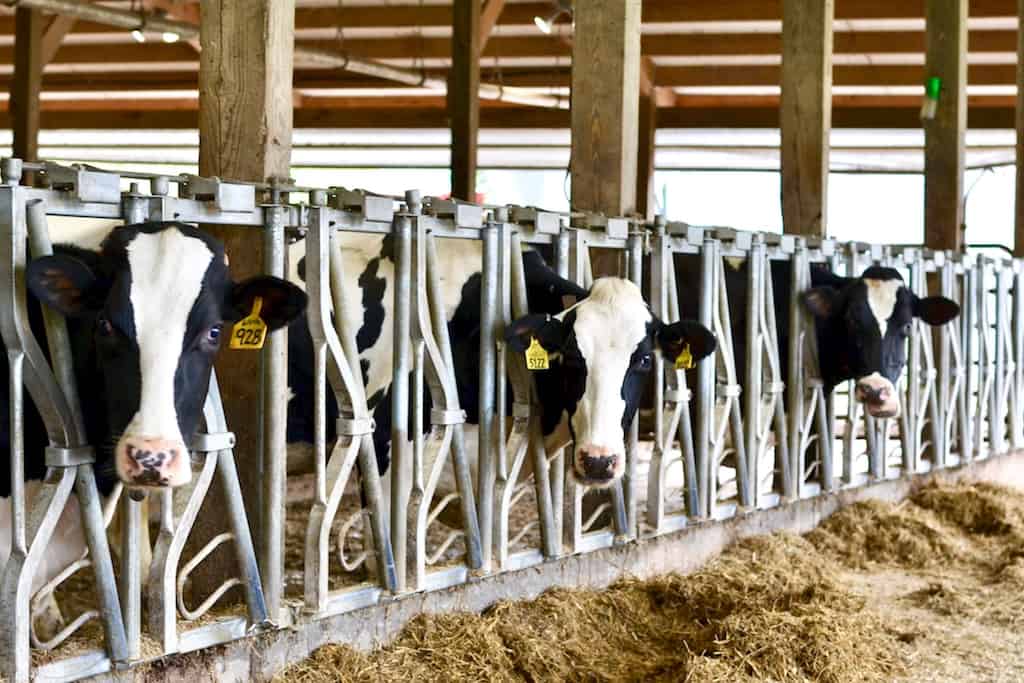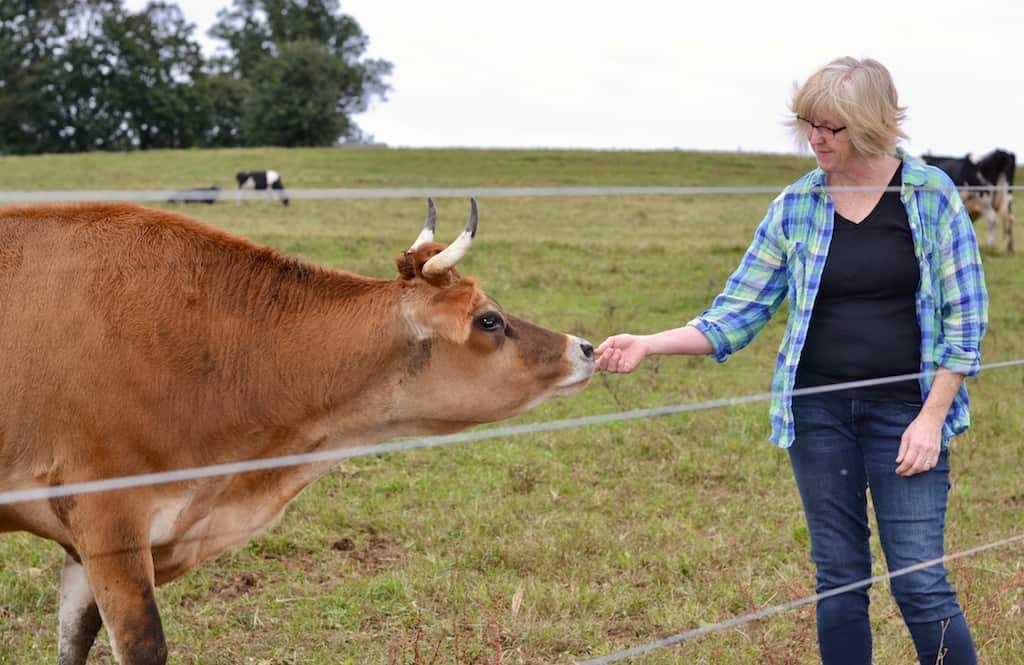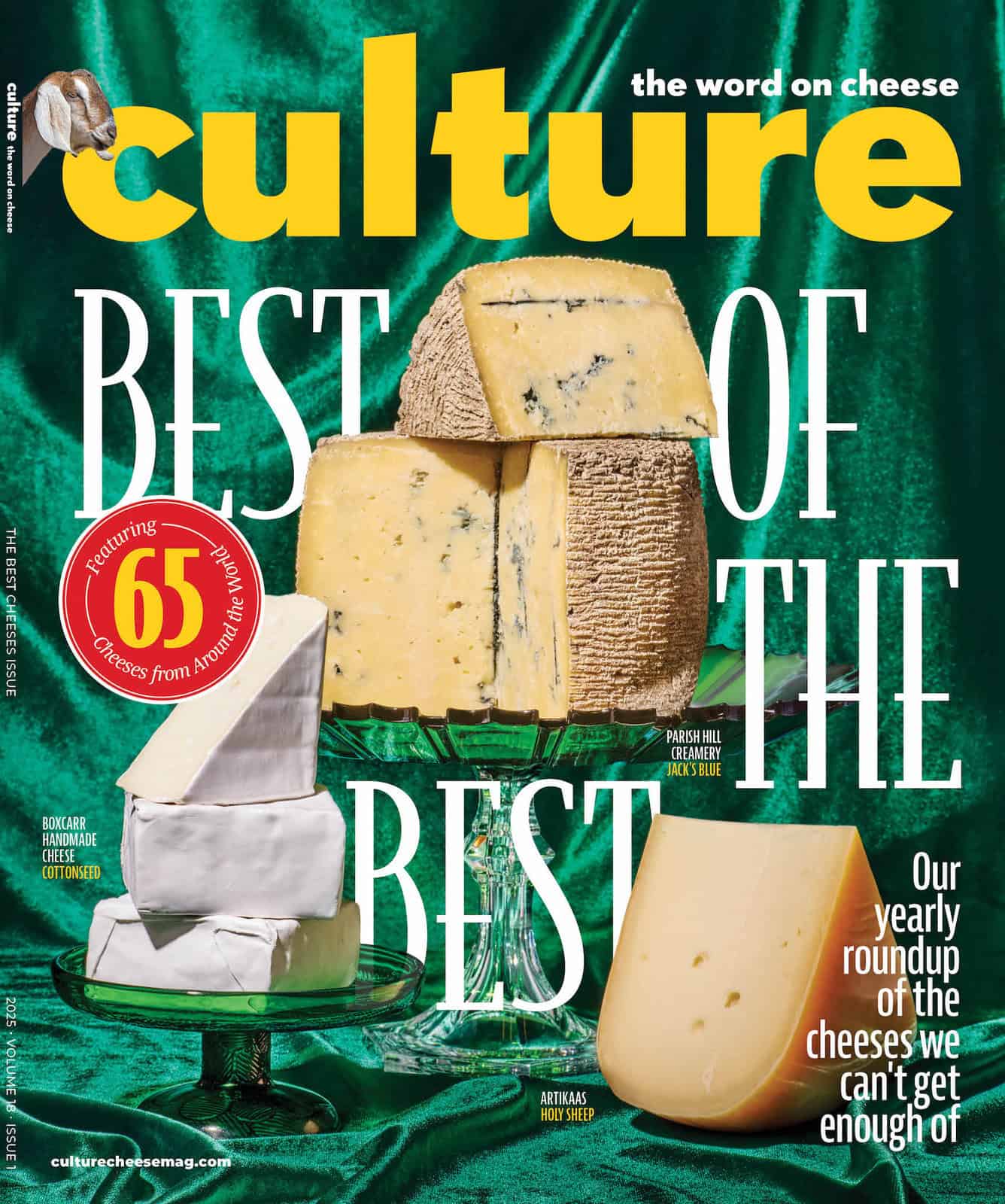
Manhattan cheesemonger Anne Saxelby has famously proclaimed that the future of cheese is female. If so, three Pennsylvania women may be the forerunners that define that future.
Standing amid the sloped acres of Birchrun Hills Farm in Chester Springs, the ground heavy from rain, farmstead cheesemaker Sue Miller is in her element. Her herd of Holstein and Jersey cows is near, grazing or strolling to their robotic milker. Also at the farm are her cofounding members of Collective Creamery: Stefanie Angstadt of Valley Milkhouse in Oley, and Philadelphia food writer and cheesemonger Alexandra Jones.
Woman-Powered
As a female-powered cheese collective, these three women run a regional CSA that focuses not only on education but also on sharing small-batch cheeses with an indelible sense of place.
“Dairy is feminine in so many ways,” muses Jones, operations manager for the Collective and a regular host of cheese classes in Philly. “Cows are female, and dairying was traditionally the province of the farm wife—she milked cows and made cheeses to supplement the family’s diet.” American dairy businesses came to be male-dominated following the shift to factory production in the 1800’s. Centuries later, Collective Creamery honors and reclaims the female roots of the industry.
Jones also links the Collective to a movement wherein women are reclaiming their place in the culinary spotlight. “Our ethos, supporting women in this industry, is something that many eaters want to support.”
This isn’t to say that the Collective is closed to male partners. Anchored by selections from Angstadt and Miller, its seasonal shares showcase like-minded producers from Virginia to Vermont. “Many of our trusted colleagues and longtime friends in the cheese world are men, or have men in key roles in their operations,” Jones says. “We’re just as interested in supporting other small, pasture-based cheese businesses and dairies making amazing products using traditional methods as we are in supporting women in agriculture.”
In doing so, the Collective tells a larger story—heralding cheese as an agricultural product. This, Miller says, is critical with the dairy industry in crisis and family farms shuttering. She would know. Following the milk price collapse in the early aughts, her pivot to cheesemaking in 2006 saved her farm. Her first foray into cheesemaking was a tenacious one: a natural-rind Birchrun Blue. Now, it is a PA classic.
“The fact that Sue Miller is such a skilled farmer, a community-builder, and just such a dynamic personality has done a lot for the community,” Jones says, noting that Miller and Angstadt were instrumental in reviving the Pennsylvania Cheese Guild. “Folks don’t realize that until 10 or 15 years ago, cheese around here was pretty much all commodity scale or Amish cheddar.”
Angstadt agrees, citing Miller—aka “the godmother of Pennsylvania cheese”—as a mentor. A 2015 Zagat 30 under 30 honoree, Angstadt is also making her mark. Called back to her ancestral land in the Oley Valley after a stint in Manhattan finance, she launched Valley Milkhouse in 2014. Where Miller is bold and animated, Angstadt has the countenance of an artist, crafting soft-ripened and fresh cheeses like her aptly named Witchgrass. A cow’s milk homage to Valencay, its blue-gray rind is tinged with charcoal ash.
Her muse in cheesemaking? The washed-rind cheeses she recalls from childhood trips to Belgium, her mother’s homeland.
Since the Collective’s formation in 2016, the trio has created a mutually reinforcing support network despite differing personalities and styles. “I think a lot of small-scale cheesemakers share the challenges that we have, which is why it’s good to commiserate and talk about it,” Angstadt says. “There are no secrets,” Miller agrees. “We could each make the exact same cheese and it would come out different, because of the milk, because of the hand of the cheesemaker, because of the environment. That is the beauty of what we do.”
Collectivism Creates Possibilities
Shared passion for celebrating pasture-based milk also inspires synergies. This fall, Angstadt launched a gouda made with milk from Miller’s farm, with a clothbound cheddar in the works. Miller, in partnering with Angstadt, is discovering new love for her “quiet” cheeses like Equinox, a Swiss-style cheese with an underpinning of toasted caramel. “That support factor has been really instrumental,” she says.
Aside from membership, the best way to keep up with Collective Creamery is to subscribe to its podcast, a Culture top-ten pick this summer. Enticing to cheese lovers, it creates shared space for dialogue among American cheesemakers. “What we kept coming back to when we were examining the purpose of all of this was trying to be as inclusive as possible,” Angstadt says. “If it’s not possible for somebody to buy our cheese or join the club, they can still be a part of the conversation.”
Photo Credit Jenn Hall







